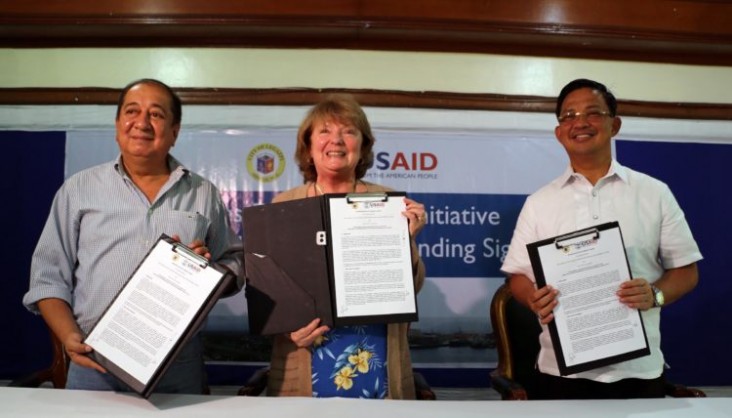
For Immediate Release
U.S. Embassy in the Philippines’ United States Agency for International Development (USAID) Mission Director Dr. Susan Brems and Legazpi City Mayor Noel Rosal signed a Memorandum of Understanding on May 17, 2017 making Legazpi the seventh city in the Philippines to join USAID’s Cities Development Initiative (CDI).
Through this initiative, USAID works closely with city governments outside Metro Manila to fulfill their potential as engines of inclusive, environmentally sustainable, and resilient growth. In Legazpi City, USAID will provide a range of technical assistance in economic growth, health, environment, governance, and education. “Legazpi City is a key driver of growth in the Bicol region, with tremendous potential to pursue inclusive development in surrounding localities in Albay and beyond,” said Dr. Brems.
USAID and its CDI city partners, including local government and the private sector, work together to develop and implement city action plans to address economic growth, education, environmental resiliency, and health challenges. “[Legazpi] City will be able to enhance its competitiveness and acquire the knowledge and skills to address disaster risks. These [projects] will help sustain our city’s development,” said Mayor Rosal.
Other USAID CDI partner cities currently include Batangas, Cagayan de Oro, Iloilo, Puerto Princesa, Tagbilaran, and Zamboanga.
During her May 16-19 visit to Legazpi City, Dr. Brems met with local officials to discuss good practices of their Climate-Adaptive and Disaster-Resilient program that has successfully prevented casualties during major disasters. Dr. Brems also toured the USAID-supported Taysan Health Center, and met with representatives of the Department of Environment and Natural Resources Region 5, the Community Environment and Natural Resources Office, local government, and civil society on the USAID-developed Lawin Forest and Biodiversity Protection System.
Dr. Brems capped her visit with a trip to the rice fields of Polangui. USAID, in partnership with the Department of Agriculture Regional Field Office 5 and local governments of Polangui, Albay and Buhi and Nabua, Camarines Sur, has increased 600 upland Bicol farmers’ resilience to extreme weather by introducing farming advisories and technology such as small-scale irrigation systems.







Comment
Make a general inquiry or suggest an improvement.